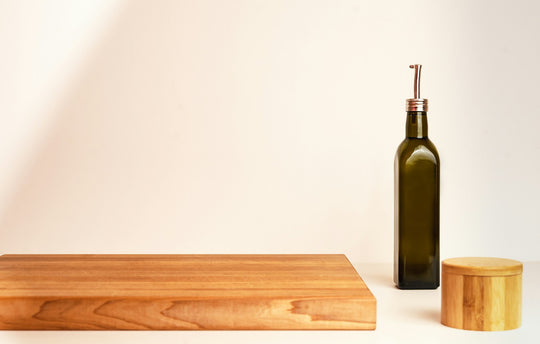Sustainable and Eco-Friendly Kitchen: How Recipe Board's Custom Engraved Cutting Boards Contribute to an Environmentally Conscious Lifestyle
Posted on April 07 2024,

As environmental awareness becomes a central concern in modern society, it’s essential to make informed decisions about the products we purchase, especially in the heart of our homes – the kitchen. We understand the importance of sustainability and eco-friendliness, striving to create custom wood-cutting boards that preserve both cherished memories and our precious environment. That’s why our expertly engraved cutting boards are crafted from sustainably sourced materials, ensuring a perfect match between the original handwriting and the finished product while respecting the Earth’s resources.
In this blog series, we will explore the world of sustainable kitchenware, focusing on the environmental benefits of incorporating custom wood cutting boards into your daily life. Discover how these high-quality products offer an ideal balance between aesthetic appeal, functionality, and a conscientious lifestyle. Our articles will provide you with valuable insights, tips, and ideas for eco-friendly living without compromising the beauty of your kitchen.
Explore practical ways to embrace an eco-conscious lifestyle, using custom wood cutting boards and other sustainable kitchenware options as key tools for reducing your carbon footprint.
The Environmental Advantages of Wooden Cutting Boards
Wooden cutting boards offer a myriad of environmental benefits compared to other materials:
- Biodegradable: Unlike plastic, wood is a natural resource that decomposes over time, contributing to a reduced environmental footprint.
- Renewable: Sustainable wood sources are grown in responsibly managed forests, where trees are replanted at a rate that ensures a continuously replenished supply.
- Antibacterial Properties: Wood's inherent antibacterial properties result in fewer harmful chemicals being used for cleaning, leading to a reduced release of pollutants into our water supply.
- Energy-Efficient Production: The manufacturing process for wooden cutting boards typically requires less energy consumption than the production of plastic or other synthetic materials.
Sustainable Sourcing: Choosing Eco-Friendly Woods for Your Custom Cutting Boards
When selecting your custom cutting board, it's crucial to consider the type of wood used, going for eco-friendly and sustainably sourced options. Here's what to look for:
- Forest Stewardship Council (FSC) Certification: The FSC certifies wood harvested from forests that meet their stringent environmental and social standards, ensuring responsible and sustainable management.
- Locally Sourced: Choosing wood sourced from local suppliers reduces the environmental impact of transportation, supports local economies, and promotes regional biodiversity.
- Fast-Growing Woods: Opt for fast-growing, easily replenished wood species, such as maple, cherry, and walnut.
- Responsibly Harvested: Ensure that your chosen wood is harvested responsibly, aligning with best practices, such as selective logging, to maintain the health and diversity of forest ecosystems.
Caring for Your Engraved Cutting Board: Tips for Prolonging its Lifespan and Reducing Waste
To maximize the eco-friendliness of your engraved cutting board, proper care and maintenance are essential in extending its lifespan:
- Cleaning: Gently clean your cutting board using warm water, mild soap, and a soft sponge. Avoid submerging the board in water or exposing it to excessive moisture, which could lead to warping or splitting.
- Drying: After washing, immediately blot dry with a clean towel and allow the cutting board to air-dry completely, placing it on the edge for better airflow.
- Regular Oil Treatment: To keep your wooden cutting board from drying out, treat it with food-grade mineral oil or cutting board conditioner every few weeks or when it begins to appear dry.
- Preventing Stains and Odors: If you encounter stubborn stains or odors, create a paste of baking soda and water, and gently scrub the affected area before rinsing clean.
Incorporating Sustainability in Your Culinary Experience: Steps to Make Your Kitchen Environmentally Friendly
Alongside adding sustainable custom wooden cutting boards to your kitchen, here are some practical suggestions to further embrace an eco-conscious lifestyle:
- Green Kitchenware: Opt for cookware, utensils, and storage containers made from eco-friendly materials like stainless steel, glass, and bamboo.
- Reduce Waste: Adopt a habit of minimizing food waste by planning meals ahead, using leftovers in creative ways, and composting organic waste.
- Save Energy: Invest in energy-efficient appliances, use lids on pots to decrease cooking time, and switch to LED lighting to reduce your energy consumption.
- Conserve Water: Limit water usage by fixing leaks, investing in a water-saving faucet, and only running your dishwasher with full loads.
Conclusion:
Incorporating Recipeboard.com's customized cutting boards into your kitchen is an impactful way to promote a more sustainable and eco-friendly lifestyle. By selecting environmentally responsible products, making sensible choices in wood sourcing, and maintaining proper care, you can help safeguard our planet's resources and minimize waste—all while enjoying a beautifully crafted, functional addition to your kitchen.
As you cherish the memories preserved on your custom cutting board, you can also take pride in knowing that you're contributing to the preservation of our environment for generations to come. An eco-conscious culinary experience is a journey of intention, extending from the warmth of your kitchen, into the vast world at large.
